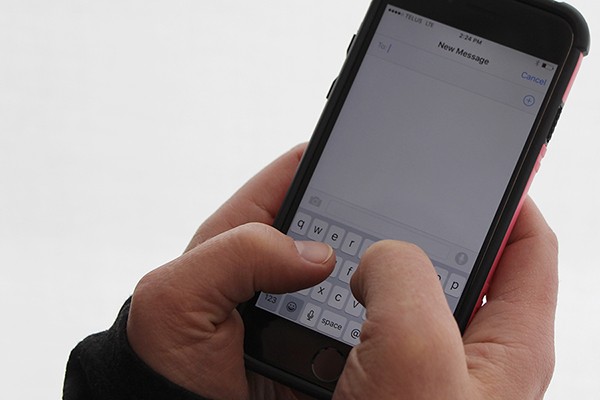 A research study by a UWindsor undergraduate student in psychology found that people who text frequently are often image-conscious pleasure seekers.
A research study by a UWindsor undergraduate student in psychology found that people who text frequently are often image-conscious pleasure seekers.
People who text frequently are often image-conscious pleasure seekers, says a University of Windsor psychology professor who supervised student research that showed students who frequently text and post on social media tend to place greater importance on morally shallow life goals and show a lower tendency to engage in deeply reflective thought.
The results of an undergraduate thesis project by Logan Annisette (BA 2014) were published in the article Social media, texting, and personality: A test of the shallowing hypothesis in the February edition of the journal Personality and Individual Differences.
Kathryn Lafreniere, coordinator of the psychology undergraduate honours thesis program, says Annisette found a strong relationship to image—especially with frequent texters—associated with goals of image, appearance to others, and hedonism.
“Where goals related to morality—like living life with genuine integrity and leading an ethical and principled life—those were negatively related,” Dr. Lafreniere says. “People espousing those ideals texted and used social media less frequently.”
She says Annisette designed the study to test the “shallowing hypothesis,” based on Nicholas Carr’s book “The Shallows: What the Internet is Doing to our Brain,” and found that other such goals as safety, autonomy, knowledge and power had no significant correlation to texting or social media use.
Research results were based on an online questionnaire completed by a sample of 149 students drawn from the psychology department participant pool. Lafreniere says the pool is a tremendous resource but there are limitations in the demographics. The majority of students enrolled in the pool are women, and women also tend to volunteer for studies at a higher rate than men, leading to samples that are disproportionately female.
Lafreniere says the journal article received media attention at home from the National Post and from the Huffington Post in the U.K., as well as interest from other news outlets around the world, demonstrating where quality undergraduate research can lead.
“It’s fantastic when an undergraduate student’s study ends up getting published in a good journal and garners such attention,” she says. “The students who do honours theses may think they are just small self-contained projects, but studies such as this show the possibility of real-world influence.”
There are currently 26 students enrolled in the psychology undergraduate thesis program, a two-semester course for undergraduates who show potential for graduate school. The professor says that students are more passionate when they research something they are personally curious about.
She says Annisette’s findings are not surprising because they tap into what many people assume about social media usage: “When you see how much time students spend texting and how people manipulate the presentation of their own lives on Facebook and Instagram, this study gives us some data to back up what many of us are already thinking.”
